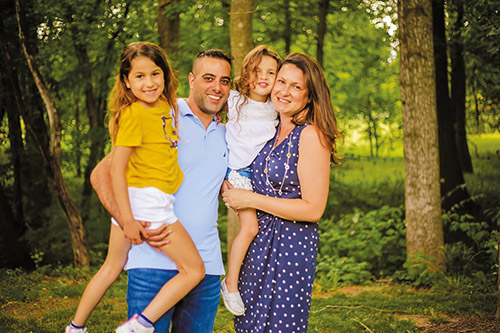

Michelle Rojas-Tal’s life as a Jerusalemite who spent the past few years traveling around North America to educate audiences about Israel is a vastly different experience from her childhood and teenage years growing up in a housing project in Queens, New York. The child of a Puerto Rican father and Jewish mother, Rojas-Tal was raised knowing she was Jewish but with little involvement in the community or connection with her Jewish roots. She and her brother were one of only a handful—if any—Jewish people in their 3,600-person high school. But her involvement in Judaism and connection to Israel began to grow during her high school years, and a series of events would eventually lead her to make aliyah in 2007 and build her life in Israel.
Rojas-Tal was always passionate about activism and government affairs. She was serving as the president of her junior high school class in 2001 when the World Trade Center was attacked by terrorists. The attacks triggered a very deep response for her, and her focus immediately turned towards Israel. “I started to ask questions,” she explained. “I knew that Israel was facing terrorism.” Her interest in Israel continued to grow during her college studies at Pace University in Manhattan, where she witnessed anti-Israel bias in her political science classes and in campus activities.
A Taglit-Birthright Israel trip in 2004 would prove to change her life trajectory. It was her first trip to Israel and her first deep encounter with Israel-related content. During the 10-day experience, she was overcome by a strong sense of belonging and the resiliency of the Israeli people. She also formed a strong bond with the Israeli security guard on the trip, whom she married three years later and has three children with.
Upon returning to the U.S. after the trip, not only did she keep in touch with her Israeli boyfriend, but she sought ways to deepen her connection with Israel. “I felt I needed to do something,” Rojas-Tal said. She began volunteering with a variety of pro-Israel organizations that included StandWithUs, an international Israel education organization that was in its early days. After making aliyah in 2007, Rojas-Tal continued to work with StandWithUs as the organization’s director of diaspora education. In this role she empowered students with the tools to fight misinformation about Israel and to proudly stand up for the Jewish state.
In 2017, Rojas-Tal was accepted as a senior shlicha (emissary) of The Jewish Agency for Israel, serving as the organization’s director of campus shlichim outside of Washington, DC, where she and her family resided during the past five years. In her leadership role, Rojas-Tal was responsible for 75 Israeli shlichim who were serving on campuses across North America. In addition to supporting the shlichim in their educational programming celebrating Israel and Jewish life, she was often called upon to help them deal with challenging situations that involved countering anti-Israel activity on campuses, from the desecration of Sukkot to hate speech.
Rojas-Tal empowered the shlichim, many of whom were recent army veterans in their early 20s, to support the Jewish students on campus who were on the frontlines of what she calls “psychological warfare” and were under incredible pressure by their peers who delegitimize the Jewish state. She feels the role the Israeli shlichim play is vital in giving the students the courage to stand up for their values. “It’s incredibly important that you have this group of diverse Israelis standing with them side by side and proactively engaging in Jewish life [and] connection to Israel, despite all the noise on the outside,” she said. Rojas-Tal also had the opportunity to work closely with former Chairman of the Jewish Agency for Israel Isaac Herzog, who now serves as the president of Israel.
With nearly 20 years of experience as an Israel educator, Rojas-Tal insists that the best form of advocacy is what she calls people-to-people diplomacy. “We need to get to know one another for who we are and for our authentic selves,” she explained. She suggested that more focus on college campuses and at the institutional level be placed on the interpersonal connections between Jewish people and members of other faith groups that can be leveraged into discussions on Zionism. She would also like to see more diverse voices from Israel featured at major events and conferences, including Arab-Israelis, Ethiopian-Israelis, charedim and women in prominent roles.
Today, Rojas-Tal has taken a break from her full-time role as an Israel educator and is focusing her time on a number of consultancy projects for major Jewish organizations, which includes serving as the Zionist scholar-in-residence for Hadassah, The Women’s Zionist Organization of America. She has many thoughts about her next big endeavor, and politics is not off the table. “Yes there is a conflict, but we are not a country defined by that conflict,” she said. “I want to be doing something where I can tell those stories.”
Looking back at her upbringing in a housing project in Queens where she knew very few Jewish people, Rojas-Tal would never have imagined that she would be married to a native Israeli and living in Jerusalem, and would be featured in Jerusalem Post’s list of most influential Jews. The resiliency of the Israeli people that she fell in love with on her first trip to Israel is very much her own story. “I don’t take any of it for granted,” she proudly said.
Alisa Bodner is a Fair Lawn native who immigrated to Israel a decade ago. She is a nonprofit management professional who enjoys writing in her free time.










